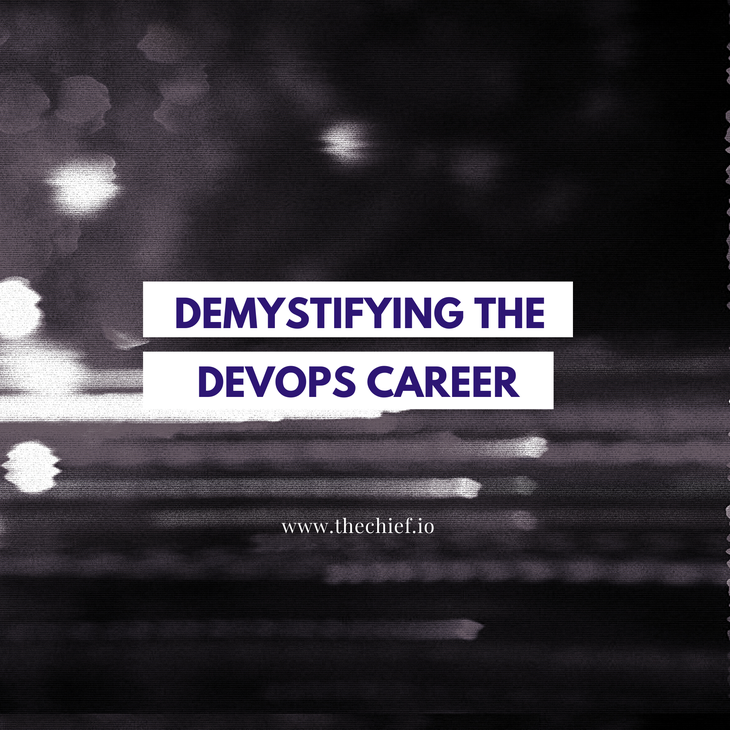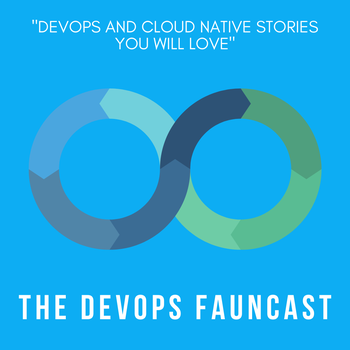
Demystifying The DevOps Career
in DevOps , Cloud Computing

The DevOps career promises a steady growth process with extensive learning opportunities; understanding the end-to-end software development lifecycle. This article addresses the misconceptions about the DevOps career, the roles, and technologies involved, as well as the future of DevOps as a career path.
The traditional software development life cycle involves two primary teams: the software development team and the IT operations team. The software development team develops the application and tests it on their machine while the IT operations teams deploy the code, configure and manage the servers. A DevOps Engineer sits right between these two teams.
More than a job, DevOps, in itself, is a mindset, a culture, and a set of practices that encourages the development and operations team to work collaboratively for more productivity and improved business benefits.
However, DevOps Engineer is a prevalent role in a modern IT environment. This is because the DevOps culture introduces new tools and practices that require a new set of skills and expertise slightly different from those readily available in the individual development and operations teams. But, there are still many misconceptions surrounding what the responsibilities of a DevOps engineer really are.
The DevOps Engineer role bridges the gap in traditional software development by acting as the middleman, collaborating with the development and operations teams to build, test, and deploy software in small, fast, and continuous chunks. A DevOps engineer needs to know the basics of Linux operating systems and be comfortable with command-line tools to perform operations tasks. He also needs to know a platform-agnostic programming language such as Python or Golang for scripting and assisting the development and operations teams to automate iterative tasks like testing and backup.
A DevOps engineer's role starts with the development team
Even though the DevOps engineer doesn't necessarily program the application, they need to understand the architecture of the application, how it is configured, and the necessary dependencies of the application stack. This will help them in configuring the servers to run the application.
When the development team is done coding and testing the application's functionality, they push it to a remote repository, usually GitHub. A DevOps engineer is responsible for testing and packaging the application using build and package management tools such as Git, Selenium, and npm so that it can be deployed to the server.
Modern applications are run in containers, so a DevOps engineer is responsible for building the container image of the application using tools such as Docker then pushing it to an artifact repository such as Dockerhub, from where it is later deployed to the server. The DevOps culture encourages automation of repetitive tasks, and as a DevOps engineer, you need to adopt automation to streamline building, testing, packaging, containerization, and deployment processes. To automate the CI, a DevOps engineer employs a set of tools such as GitLab and Jenkins, which executes this process sequentially and connects it to the application repository. When these processes are done continuously, it is referred to as the continuous integration and continuous deployment (CI/CD) pipeline.
Since organizations are moving to the cloud, a DevOps engineer also needs to know how to configure and use tools provided by cloud platforms to prepare the application servers. In addition, he also needs to understand how to provision and configure virtual infrastructure using IaC tools such as Terraform, Chef, and Ansible.
As the user base and the number of microservices of an application grows, a DevOps engineer is responsible for tracking and managing the application using tools like Kubernetes. But, first, the engineer must learn how to use Kubernetes to manage the containers in a cluster and deploy it to the server.
To track the performance of applications, a DevOps engineer needs to adopt and configure monitoring and logging tools to help the team understand the impact of their application and detect failures in the applications or system.
In essence, the DevOps process involves eight phases: coding, planning, monitoring, deployment, building, testing, release, and operation. Therefore, a successful DevOps engineer must be experienced with at least one tool to configure, manage, and automate each phase.
A DevOps engineer's role is to build and test code continuously with scripting and programming languages, manage, track and document changes to code with source control tools, deploy and configure applications using automation configuration management tools, monitor and measure the performance of the environment and application with system & application log tools.
A DevOps engineer needs to learn a variety of tools including bash, Python or Golang for scripting, Linux for system operations, one of AWS, GCP, or Azure as a cloud platform, Terraform, Ansible, or Cloud formation for IaC and configuration management, Jenkins, CircleCI, or GitLab for CI/CD automation, CloudWatch for monitoring, and Kafka, Elasticsearch or MongoDB for database management.
A DevOps engineering role requires you to be knowledgeable enough to prepare and configure your infrastructure to run the application. Still, it does not take over the operations role. A DevOps engineer must be well-versed to prepare, configure, deploy applications to the server, but he does not replace the role of an IT operator.
It would be best to have good communication skills and a team working spirit.
In the IT industry today, DevOps is one of the highest-paying roles
This is because a DevOps Engineer plays a crucial role in ensuring fast, consistent and continuous delivery of applications.
The salary of a DevOps engineer varies with location, years of experience, and the industry.
Generally, the USA is the highest paying country in the technology industries. According to Glassdoor, the average yearly salary of a DevOps engineer is about $98k in the US, 87k CAD in Canada, 3 million NGN in Nigeria, 180k AED in UAE, and R$ 96k in Brazil.
A more experienced practitioner with a lead DevOps engineer goes home with up to 148k yearly in the US.
Despite the slow-down in business caused by the Covid 19 pandemic, a 2020 survey of over 2,300 IT professionals by Puppet shows that salaries for a DevOps role have increased across regions.
According to the report, DevOps professionals working in the Pharmaceuticals and healthcare industry are the top earners worldwide, with 64% of respondents earning more than 100k USD in annual income while those in the technology industry trail at 45%.
67% of respondents from Japan now earn over 75k USD compared to only 24% in that range in the previous year. The United Kingdom follows closely with 74% of respondents earning in that salary bracket compared to 57% in 2019. At the same time, the US takes the lead with 84% making over 100k and 42% earning over 150k.
Considering the consistent increase in the adoption of DevOps portrayed by the annual rise in DevOps salary worldwide, it is safe to say the future looks excellent for a DevOps role.
However, for a dynamic field such as DevOps, new technologies are constantly emerging, and it is essential to keep up with the latest technologies. Recently, the booming technology in the software engineering field in general and DevOps, in particular, is artificial intelligence. With practices such as artificial intelligence for operations, AIOps, and machine learning for operations, MLOps, AI is rapidly gaining ground in assisting DevOps to achieve its goal; automation and collaboration. Other technologies and practices such as GitOps and DevSecOps are also gaining importance in the DevOps' role. To stay relevant as a DevOps personnel, it is vital that you learn these technologies and are constantly looking out for new tools to make your DevOps job easier.
The DevOps space is constantly evolving, and various new positions are emerging from it. Even though the impact of a DevOps engineer will remain untouched, some of these new roles will eventually become as widely accepted as the DevOps Engineer role in the future. Roles such as site reliability engineer, build engineer, and platform engineer may soon become a prominent role in many modern software development organizations with DevOps' maturity. Referring to the report by Puppet, Platform Engineers are the best-paid DevOps-related job title in the tech field with a higher possibility to earn more than 150k USD in annual income. This signal that such a role may soon become the "big thing" after DevOps Engineer.
It would help if you could also look into other DevOps-related roles to better position yourself for long-term relevance as technology and the software field evolves.
Conclusion
The DevOps engineering role involves a long learning curve accompanied by a competitive salary that compliments it.
Get similar stories in your inbox weekly, for free
Share this story:

The Chief I/O
The team behind this website. We help IT leaders, decision-makers and IT professionals understand topics like Distributed Computing, AIOps & Cloud Native
Latest stories
How ManageEngine Applications Manager Can Help Overcome Challenges In Kubernetes Monitoring
We tested ManageEngine Applications Manager to monitor different Kubernetes clusters. This post shares our review …
AIOps with Site24x7: Maximizing Efficiency at an Affordable Cost
In this post we'll dive deep into integrating AIOps in your business suing Site24x7 to …
A Review of Zoho ManageEngine
Zoho Corp., formerly known as AdventNet Inc., has established itself as a major player in …
Should I learn Java in 2023? A Practical Guide
Java is one of the most widely used programming languages in the world. It has …
The fastest way to ramp up on DevOps
You probably have been thinking of moving to DevOps or learning DevOps as a beginner. …
Why You Need a Blockchain Node Provider
In this article, we briefly cover the concept of blockchain nodes provider and explain why …
Top 5 Virtual desktop Provides in 2022
Here are the top 5 virtual desktop providers who offer a range of benefits such …














